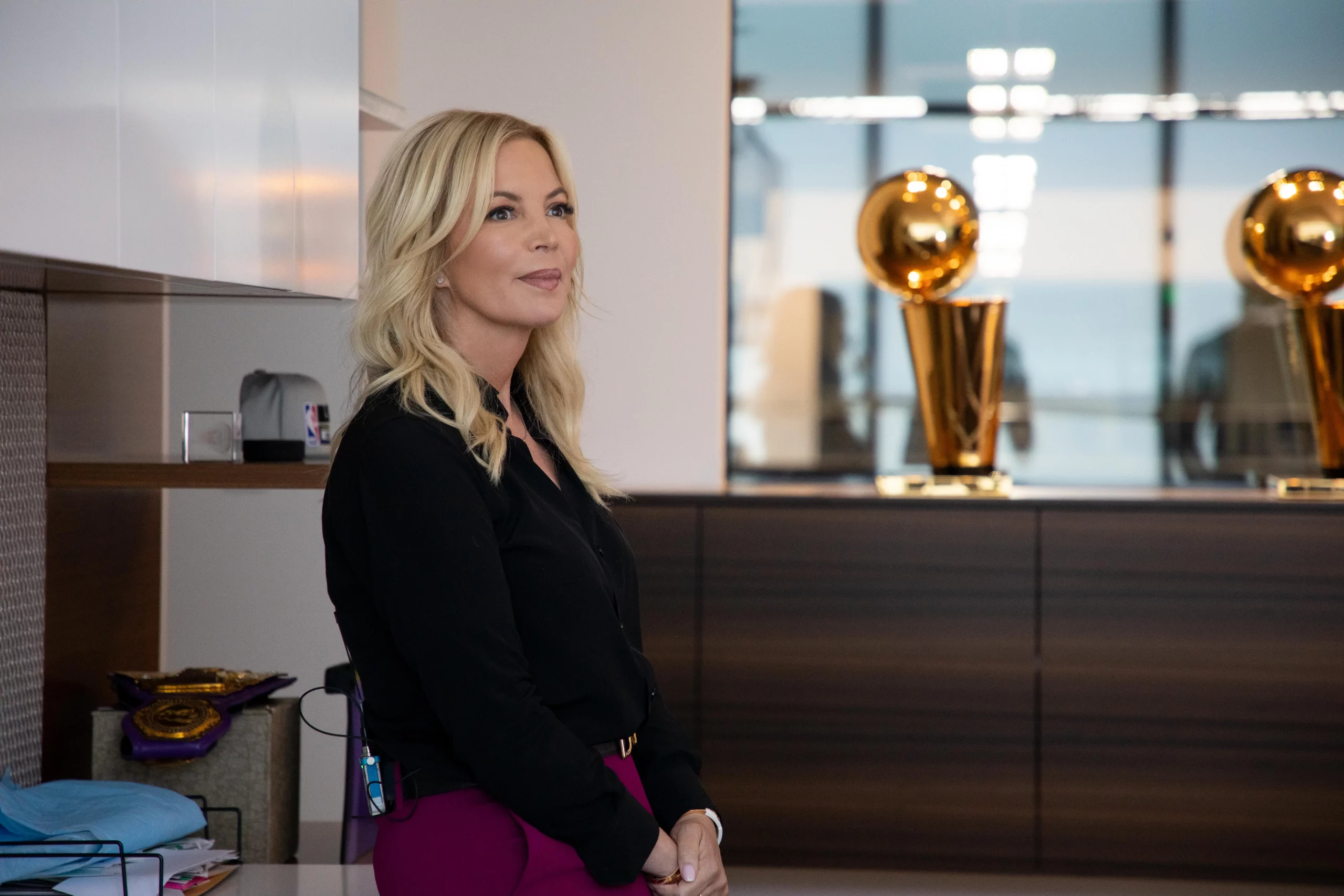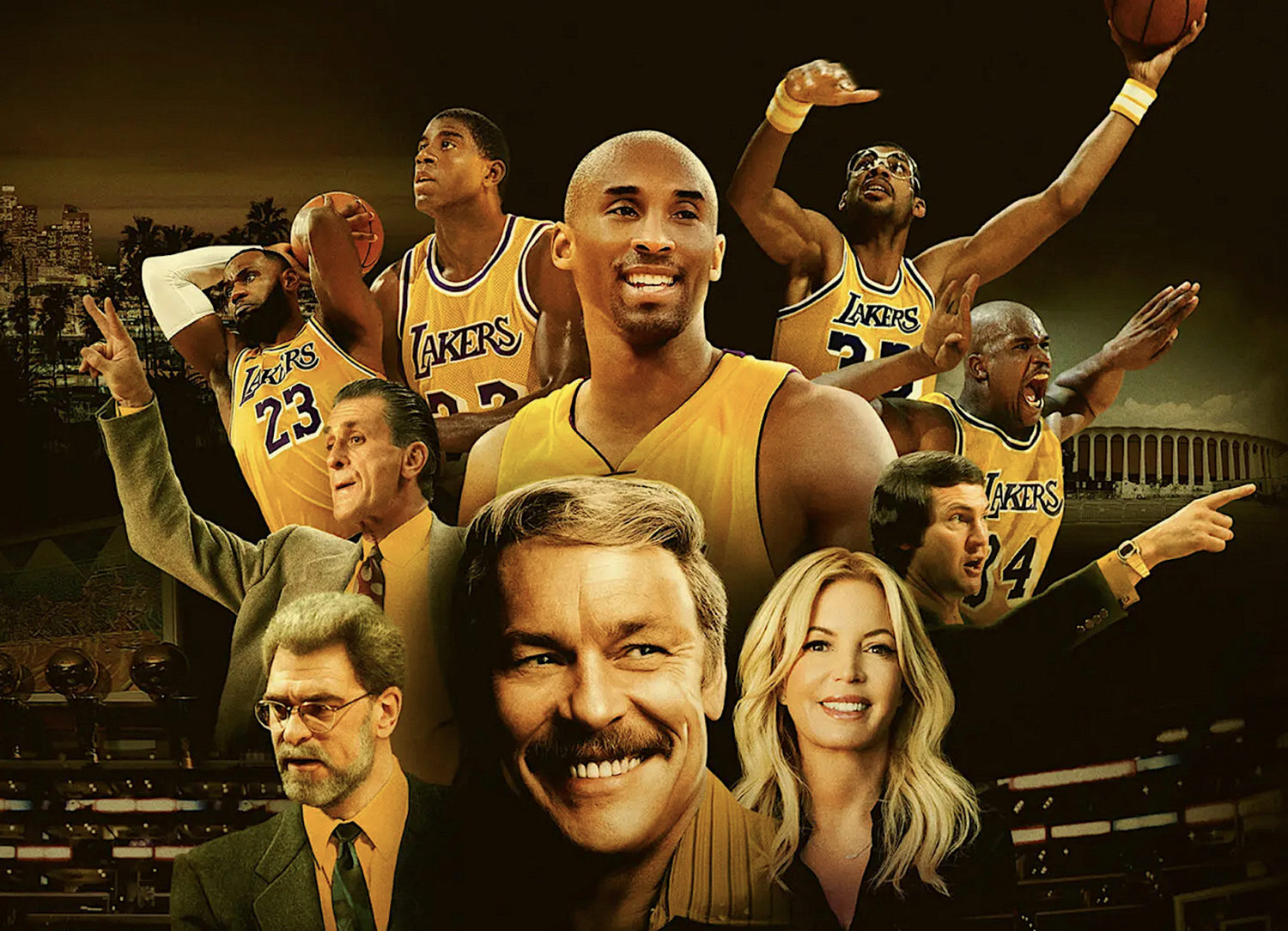
Bringing an elevated level of spectacle and showmanship to the business of basketball, just as the sexy ‘70s danced and dribbled into the even more extravagant ‘80s, Dr. Jerry Buss was a visionary whose think-big spirit made The Los Angeles Lakers one of the most iconic sports teams of all time. But it wasn’t just the team owner’s business savvy and willingness to take risks that led to his stupendous success. Buss’ approach to every transaction, trade and deal possessed a nurturing father-like fervor that made people trust him, even if ironically, it took him away from his own kids when they were young. That didn’t last for long, though. Buss’ purchase of the Lakers and other sports franchises soon became a catalyst for bringing his offspring into the mix and fashioning a full-fledged family business. In Legacy: The True Story of the LA Lakers, the magnate’s four grown kids discuss the team’s evolution alongside its biggest and brightest ballers, including Kareem Abdul Jabbar, Irving “Magic” Johnson, James Worthy, Byron Scott, Shaquille O’Neil, Nick Van Exel, Vlade Divac, Derek Fisher, Rick Fox and many, many more — each sharing their own perspectives and experiences as part of the team’s epic rise, and some of its distressing falls, too.
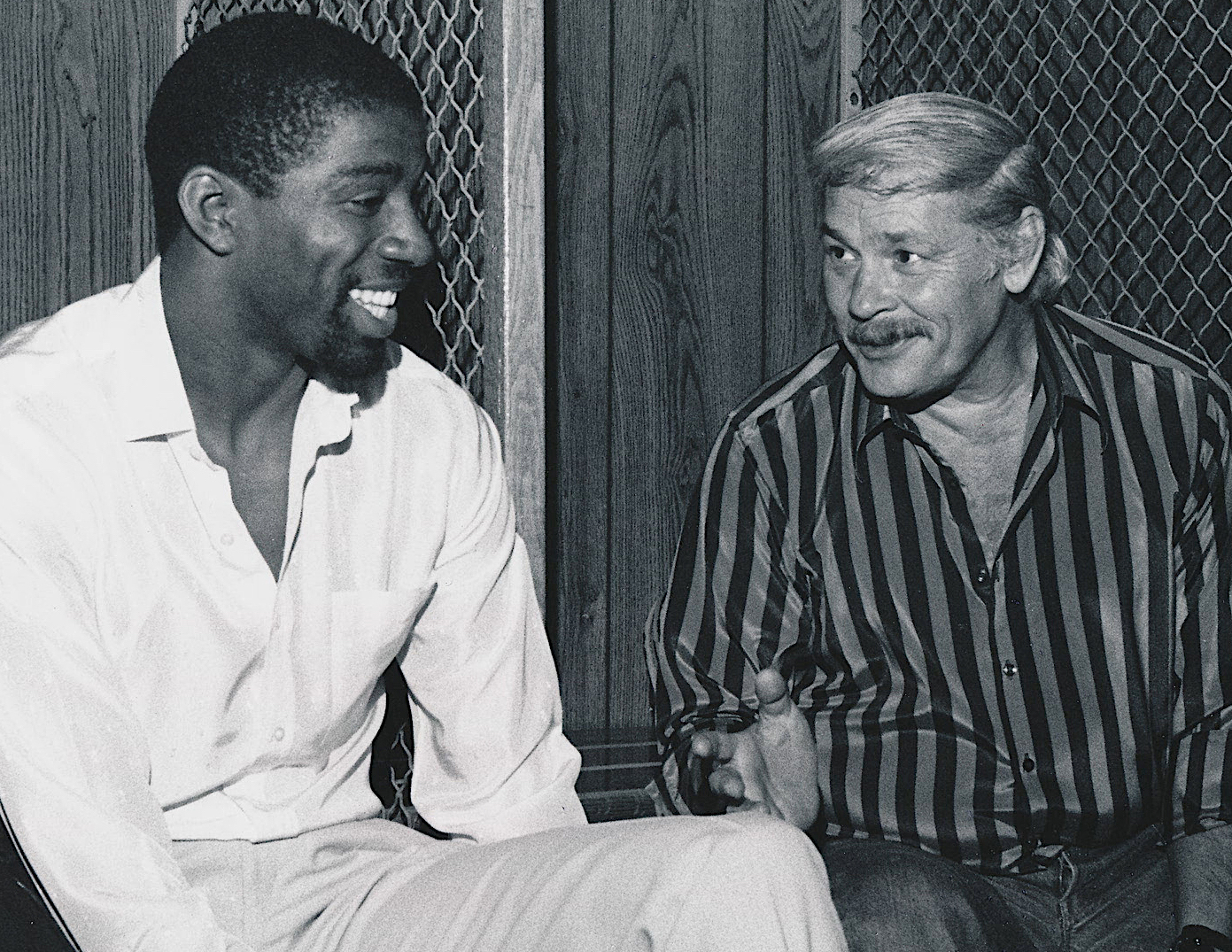
(Courtesy Hulu/Los Angeles Lakers)
As any Lakers fan knows, there have been plenty of beefs and conflicts among players and management on the court and off over the last 40+ years: Magic and Paul Westhead, Shaq and Kobe, Pat Riley and everyone… In many ways these mirrored some of the power struggles of the Buss family itself, which ultimately saw daughter Jeanie take the reins and lead the team on her own terms. We’ve seen other Lakers projects recently, such as HBO Max’s Winning Time (an audacious, highly stylized take on Buss’ first season) and They Call Me Magic (which sought to capture Johnson’s mojo with a limited-focus approach as Michael Jordan’s The Last Dance did a few years prior). Only Legacy comes straight from the franchise itself; Jeanie is an executive producer. Her perspective positions the story with a refreshing feminist subtext, even as the series highlights the toxic masculinity of some players and coaches, not to mention her father’s playboy ways.
In fact, Jeanie’s journey shows that nepotism will only get you so far. Children of highly successful parents have huge expectations to contend with, and in her case, siblings to compete with. In the ultimate male-dominated arena, with the world watching, Jeanie learned from the best and worked hard for her triumphs, serving as inspiration for women everywhere. Beyond the drama and discord between dunks, this might be one of the biggest takeaways from Legacy. It’s definitely something we want to discuss with Buss when we get the chance to chat with her and spend a day at the Lakers’ Training Facility (also called UCLA Health Facility) in El Segundo during a Hulu-organized press event for the series.
“When I was younger, seeing a woman in a position of power was very inspiring to me, and it allowed me to think about what the possibilities were,” Buss tells us during a round of interviews overlooking the floor where her legendary team currently practices. “Certainly having a father who advocated for me and supported me and believed in me was a huge help. I say to all the girl dads out there, you know, lean in and inspire your daughter.”
“I want to know who the next one is,” Buss continues, explaining that when she was told she was the first woman to win a championship, she thought about what that might mean to other females fighting to be seen in business, but more specifically the sports business, which hasn’t been traditionally welcoming. “So I hope that as a role model, I can encourage women to join this field. But no matter what they do, I want them to know that ‘you belong, you deserve a seat at the table. Own it and be passionate, but also be decisive in what it is you want to do.’”
While the HBO series (focused on what’s known as the “Showtime” era of the team) depicted Jeanie as smart but somewhat meek, she comes off as anything but in Hulu’s 10-part series, which debuted this week, and will stream a new episode every week through Oct. 10. She is outspoken and ambitious from the start.
We enjoyed a lot about Winning Time, from John C. Reilly’s performance to the look-alikes who played Magic and Kareem to the vintage filming techniques and edits that made it feel like it was actually made in the ‘70s. But it must be stated and stressed: HBO’s take, based on Jeff Pearlman’s book Showtime: Magic, Kareem, Riley, and the Los Angeles Lakers Dynasty of the 1980s (and just renewed for a second season), is fiction based on fact and it took a lot of liberties. For example, Jerry’s mother Jessie, played by Sally Field as a central figure in the Lakers organization, died before he even bought the team.
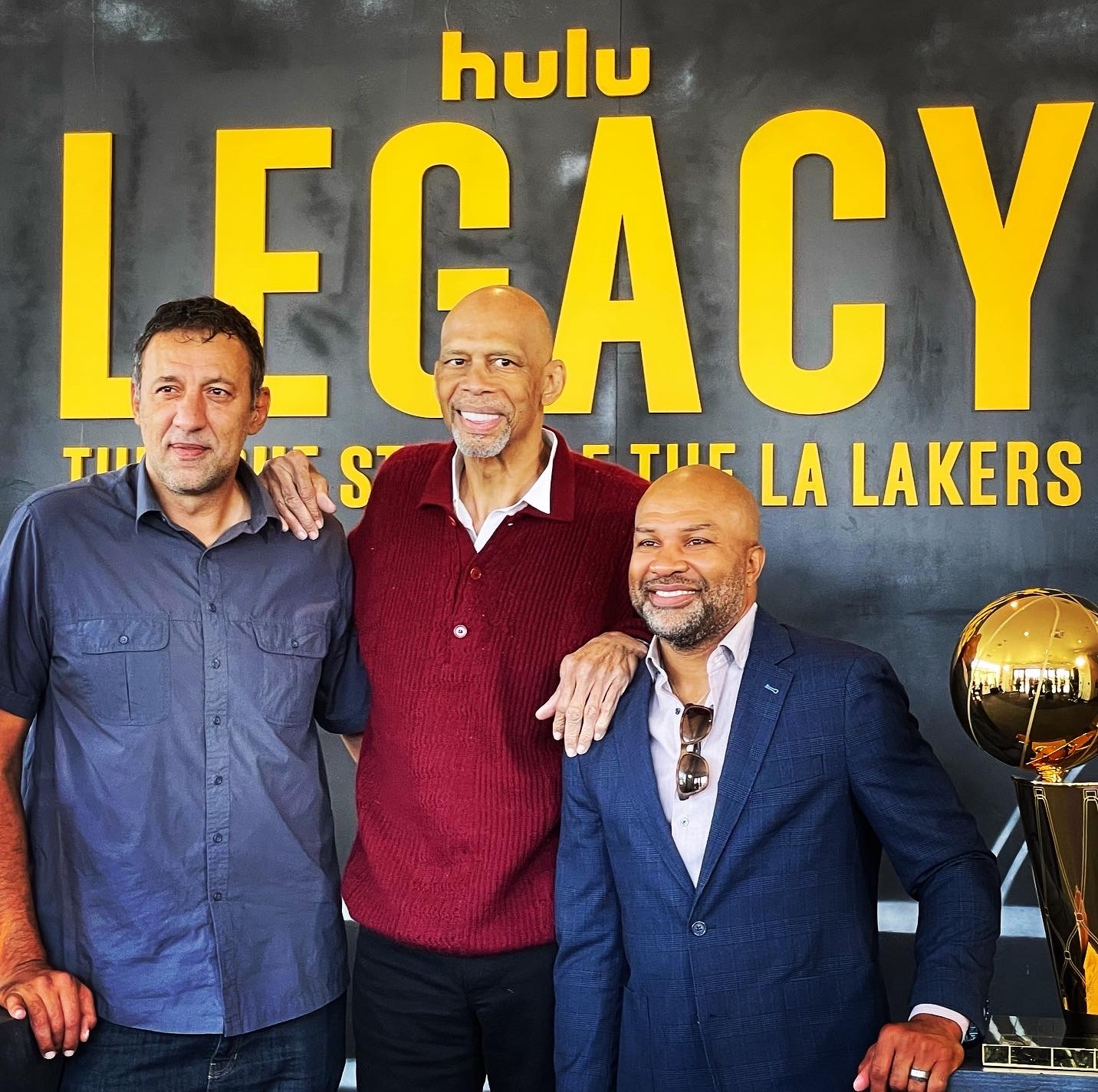
Vlade Divac, Kareem Abdul-Jabbar and Derek Fisher (Lina Lecaro)
Most of the players and coaches weren’t too happy with HBO’s dramatization either. Jerry West threatened to sue, stating that he was portrayed as “an out-of-control, intoxicated rage-aholic” according to his lawyers. Johnson also slammed it as inaccurate, telling Variety that “you can’t do a story about the Lakers without the Lakers,” and adding that no one from the scripted series ever reached out to him for involvement or corroboration. Jabbar concurred, calling Winning Time “deliberately dishonest” and “drearily dull” in an essay on his personal Substack account.
The opportunity to briefly chat with Jabbar about his participation in Legacy (which was in development long before Winning Time) is a highpoint at the Hulu event. He owns his actions and emotions while looking back at his Showtime-era heyday, as well as the slump that occurred after that first big win. But when we ask him if he had any reservations about reflecting on the tense moments of the team’s history, he says no.
“I didn’t have many tough moments,” he insists. “As an individual I was getting the job done, but as a team we weren’t winning. So I never came down that hard on myself because I knew I was doing my job. When it got to the point that we had the right people in the right places, we won.”
Both Jabbar and Johnson share a lot in Legacy, providing an extensive look at how their incredible talents came together on the court and sometimes created tension off of it. Jabbar was already a legend people loved to watch, but Magic brought a new exuberance to the team that helped fill seats, which benefited everyone involved.
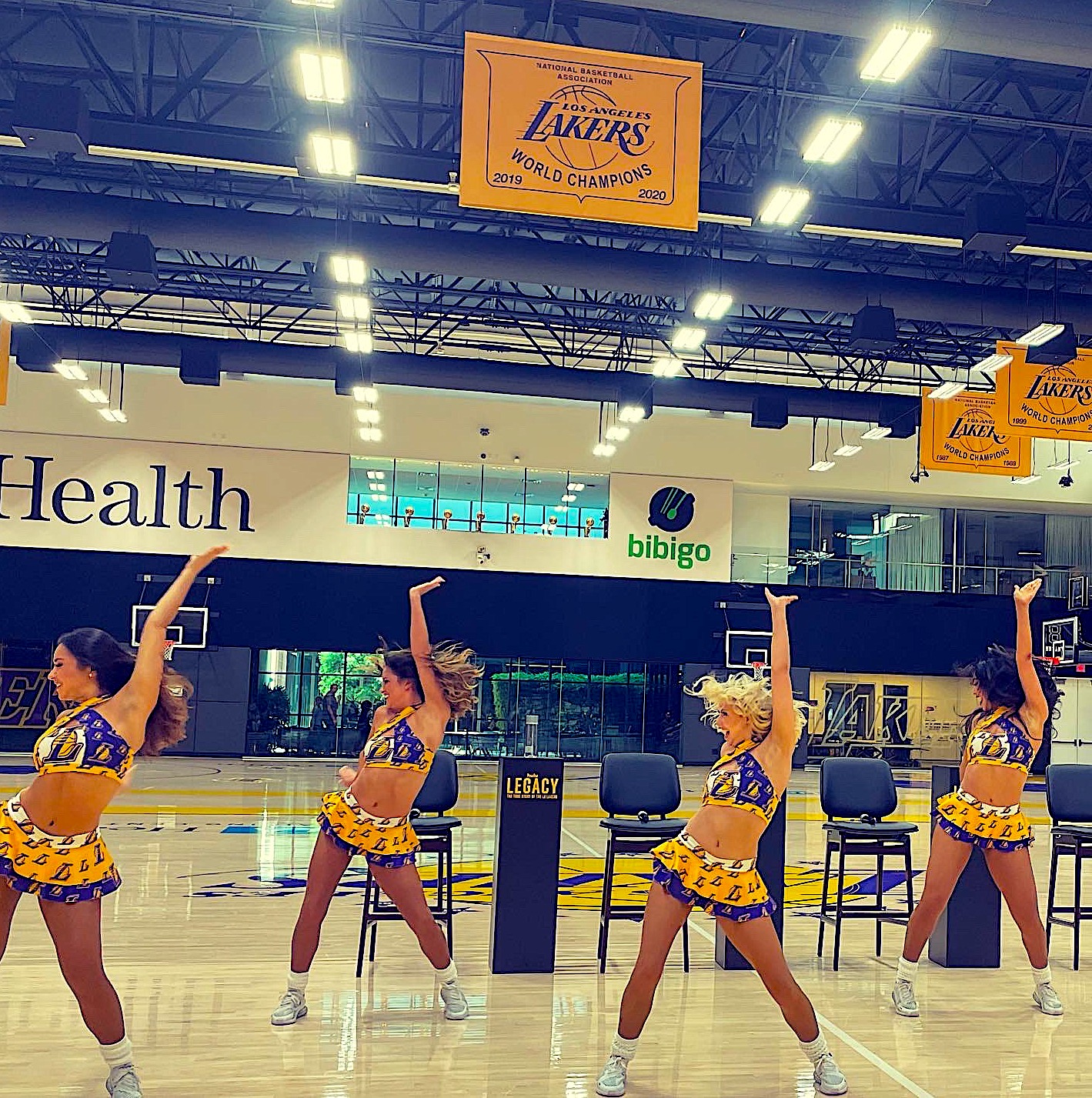
The Laker Girls (Lina Lecaro)
Beyond the players themselves, Laker games sought to re-package the glamour and energy of Hollywood, from the stars who sat courtside to the lighting design at the Forum (which was the first to take on a major sponsor’s name via Great Western Bank) to the Laker girls cheerleaders and a live band performing at halftime. Buss made Laker games such hot tickets that he could soon develop “premium seating,” with tiered pricing that was substantially higher than most teams, but worth it. He also created the Prime Ticket TV service, so fans could watch at home. It wasn’t long before other owners in the NBA followed his lead, and emulated almost everything he did.
Dr. Buss (who had a Ph.D. in chemistry but also had a knack for real estate) acquired the Lakers, the NHL Kings, the Forum and a ranch in Sierra Nevada from business tycoon Jack Kent Cooke, after Cooke’s divorce pushed him to sell. The price was $67.5 million. It was a complex deal that included property swaps to save on taxes and involved the Chrysler building in New York. Other investors had to be brought in, as Buss couldn’t afford it alone, but the deal ultimately went through, and the rest is history. Today, the Lakers alone are said to be worth more than $5 billion.
Though Legacy is mostly chronological, beginning with the sale, it bounces back into Jerry’s personal story to illustrate how driven he was and why, later in the series. Buss also was a big gambler and, by all accounts, a lucky one. He was a complex man who cared about people but would probably be looked upon as problematic by many today in terms of his personal life. After splitting from Jeanie and her siblings Johnny, Jim and Janie’s mom (yes, they liked “J” names), he led a lifestyle not unlike his buddy Hugh Hefner, dating so many young women that he kept scrapbooks with their headshots as mementos. He had a different gal on his arm every time he walked into the Forum Club (the venue’s after party hotspot likened to the Playboy Mansion meets Studio 54 in the doc), and its implied that his womanizing ways may have rubbed off on his young superstar Magic, as the pair spent a lot of time together.
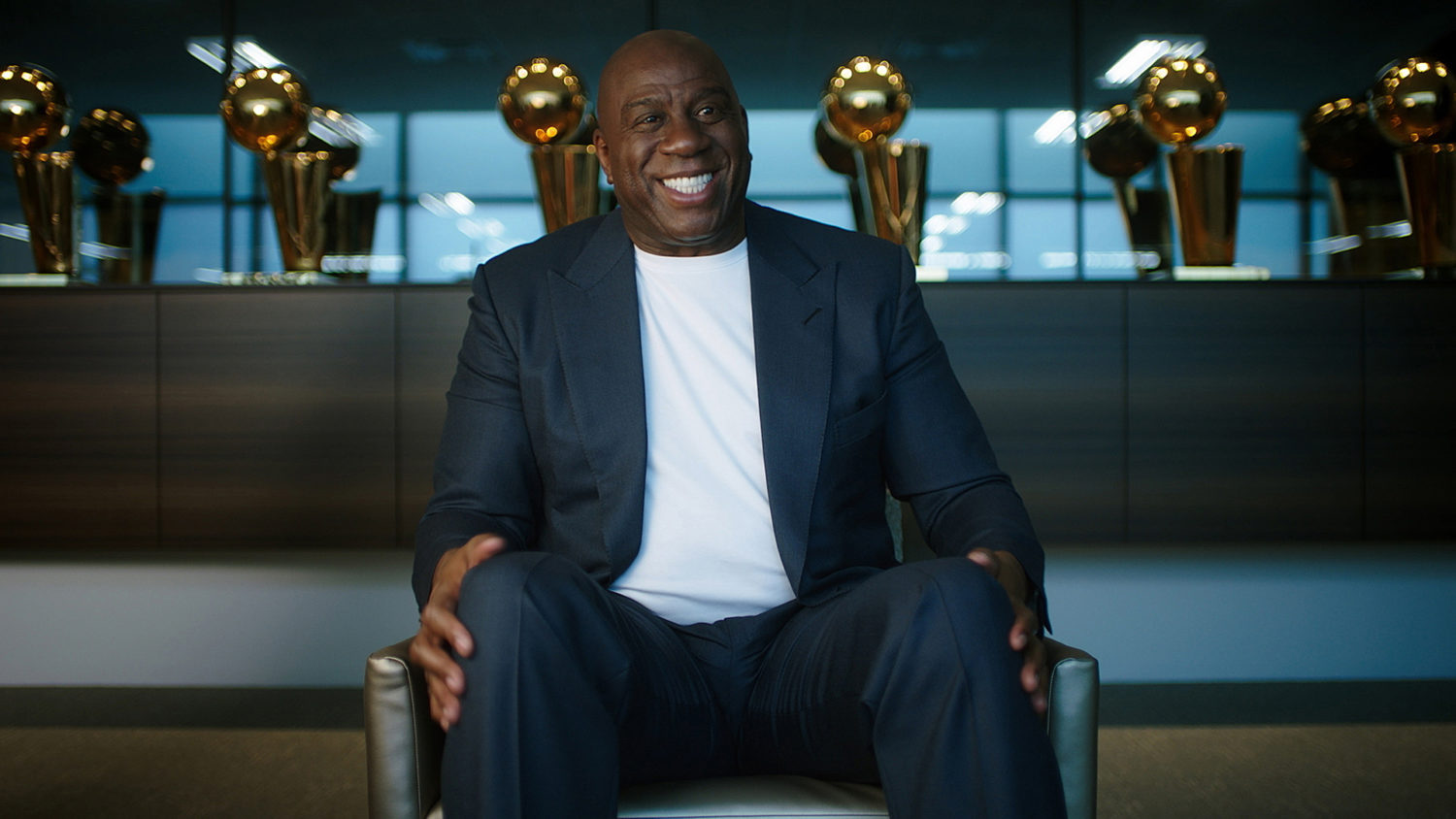
Magic Johnson (Courtesy Hulu)
There are some dark moments even before Johnson’s heartbreaking announcement of his HIV status in Episode Four. Magic publicly asks to be traded due to a rocky relationship with Paul Westhead (who got the job after coach Jack McKinney had a terrible bike accident). Buss fired him, and tried to get West on board, but West made it clear he didn’t want the job, so assistant coach Pat Riley was given control, which he relished. Riley’s high-pressure leadership eventually garnered results, and the team won three out of four championships, from 1985-1989. Also in Episode Four, Jabbar retires, the Buss kids pull away from the family business, and the team brings in some new blood, namely Serbian player Vlade Divac, one of the first European basketball stars to transfer to the NBA in the late 1980s.
After the press conference and a Laker Girls performance on the practice facility’s gleaming logo-adorned court, reporters are led behind a large metallic gold door into the Lakers’ private quarters, where players hang out when they’re not pushing and perfecting their game. There’s a lounge with a wide-screen TV, video games and a barber’s chair, plus a stylishly modern kitchen and patio where more interviews take place. We chat with Divac and Fisher, two popular players who take part in the series, and both are kind and open about reflecting on the past. They clearly love their team.
“We came here to tell everybody our feelings, our experiences, and what it meant for us being part of this organization, “ Divac shares. “Obviously there were terrible moments to remember, such as what happened with Magic in the early ‘90s, that was hard. But overall, it was great to be a part of.”
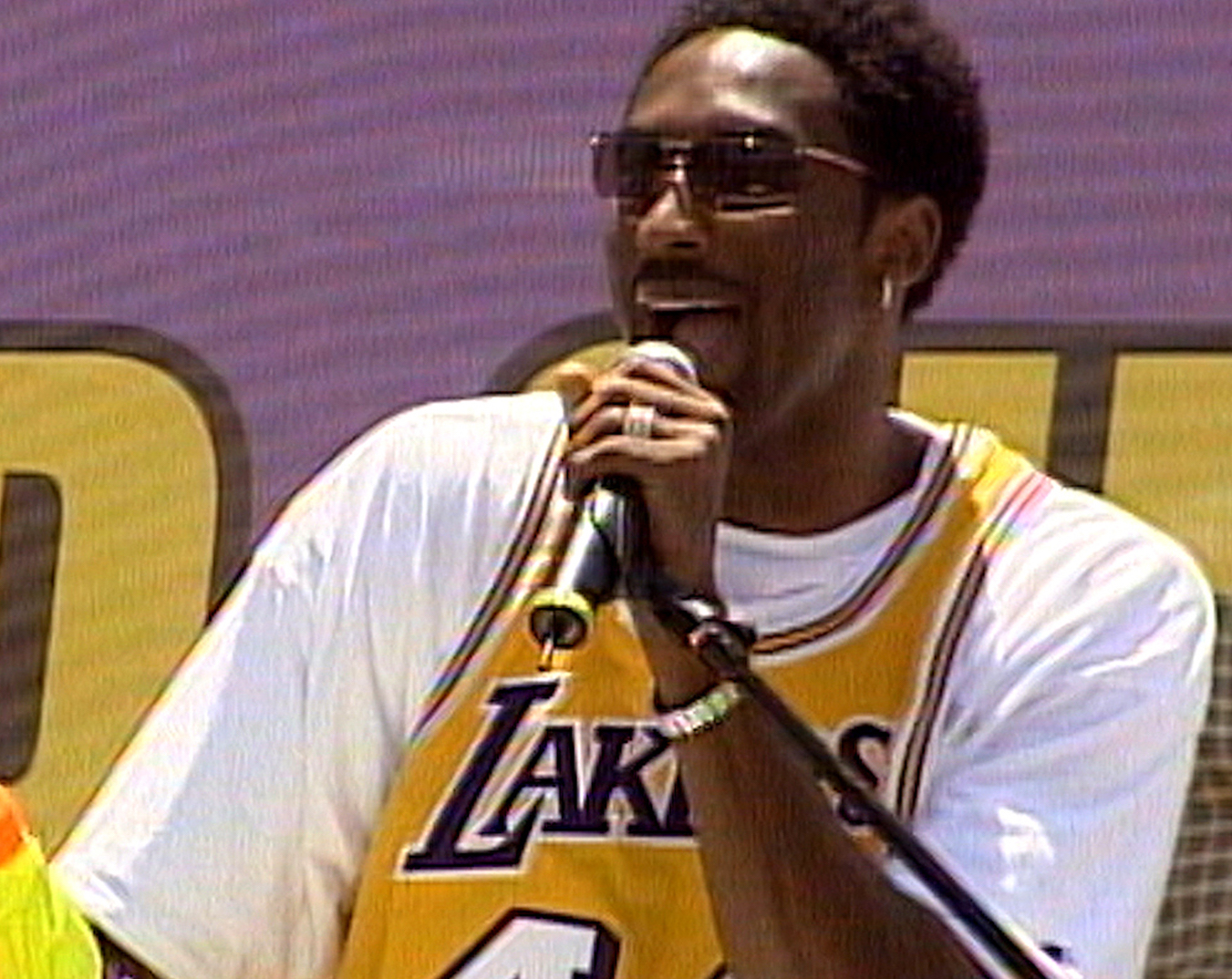
Kobe Bryant (Courtesy Hulu/Los Angeles Lakers)
Fisher, who became a Laker in 1996 alongside Shaquille O’Neil and Kobe Bryant, says that what he’s seen of Legacy so far is “phenomenal.”
“The way they put everyone’s voices, thoughts and perspectives together into one project and made it flow like it does, I feel fortunate to be a part of it,” he tells us, though he does admit that one element was challenging. “Sharing moments that involved and/or included Kobe and him not being here to answer or speak for himself. That was probably the hardest part for me. If there was a story that included Kobe, I wanted him to have the opportunity to speak to that himself.”
Journalists were not given all of Legacy’s 10 episodes to screen, so we can’t say much about the last four, but the Kobe-Shaq years make up the entirety of Episode Six, and the dynamic between the two is electric to watch. Bryant, as we all know, joined the NBA straight out of high school in ‘96, alongside Fisher and Shaq (the latter signing the biggest contract in NBA history). There were definitely conflicts with this team lineup, and those who expected a Magic-Kareem dynamic were initially disappointed. Kobe in particular had some problems with teamwork and trust in his youth. “The true definition of a great player is one that makes players around you better,” Shaq reflects in the series, which reveals that team meetings often concerned Bryant’s sometimes selfish way of playing. “You can’t come in doing everything by yourself and pissing everyone off.”
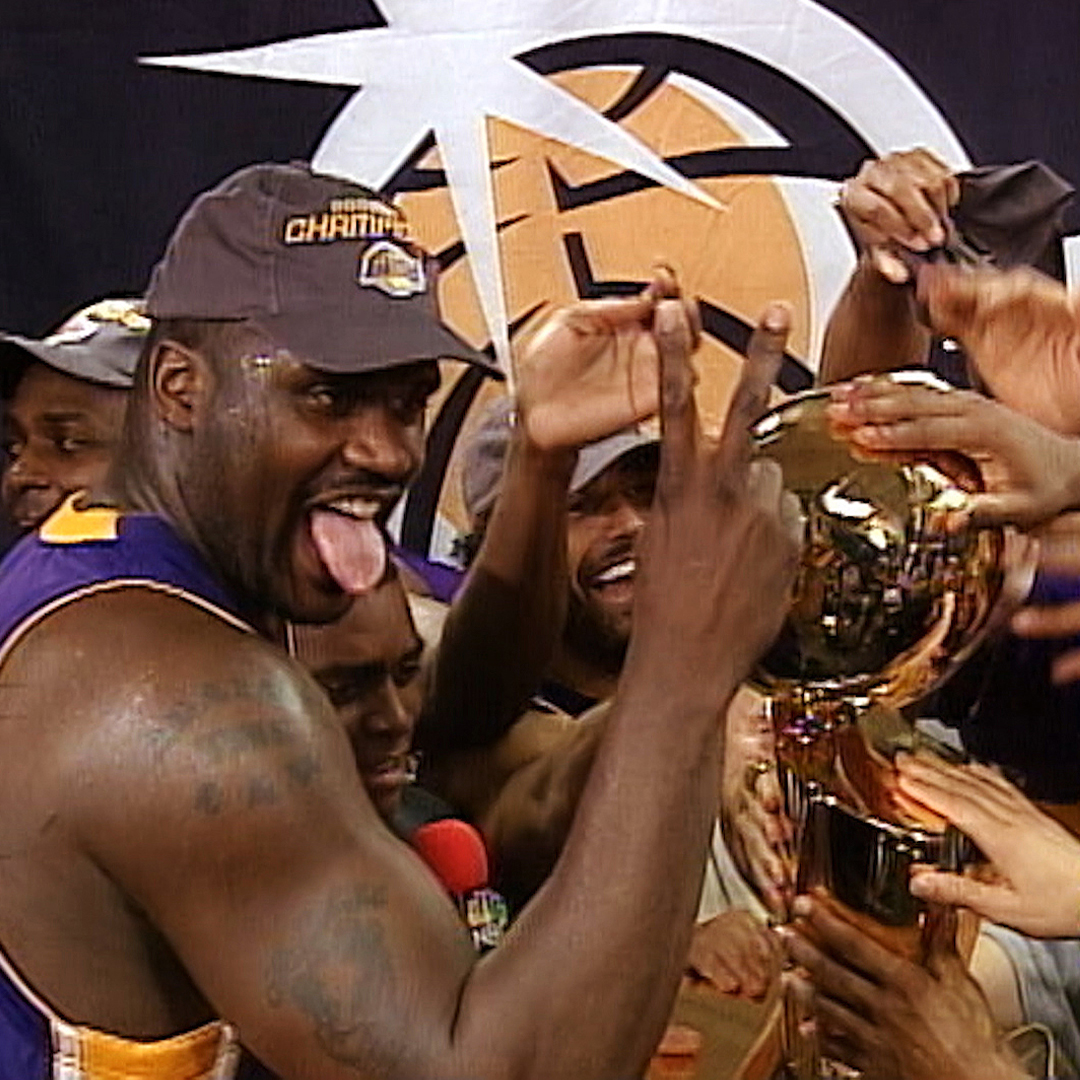
Shaquille O’Neil (Courtesy Hulu/Los Angeles Lakers)
Ultimately Bryant became more inclusive and with help from new coach Phil Jackson, the Lakers brought Los Angeles five championships, their collective skills and star power even surpassing the Showtime era. But the struggle for dominance didn’t make things easy. As a season ticket holder in their then-new home, The Staples Center, during the late ‘90s, we can attest to the overall intensity of this Lakers’ incarnation, which was palpable even from our nosebleed seats.
As Ice Cube says in the series, “You don’t have Batman and Robin, you have Batman and Superman.” (If we’re making superhero analogies, we’ll dub Jackson, Captain America, and Jeanie, who started a relationship with the coach during this period, Wonder Woman.)
Cube isn’t the only celebrity to offer perspective in Legacy. Snoop Dogg brings some Laker-izzle love to the heap of talking heads, alongside Red Hot Chili Peppers’ bassist Flea, actor Rob Lowe, and producer Lou Adler (who like famous fan Jack Nicholson – who’s missed here – always sat courtside). All the coaches get their time, with Riley coming off as the most self-reflective.
Some might think the Buss family’s involvement could make the series a promotional work for the team, and it some ways it is, but it’s not a fluff piece. The family doesn’t shy away from its own conflicts and each member comes off transparent in terms of their feelings for their father, each other and the team.
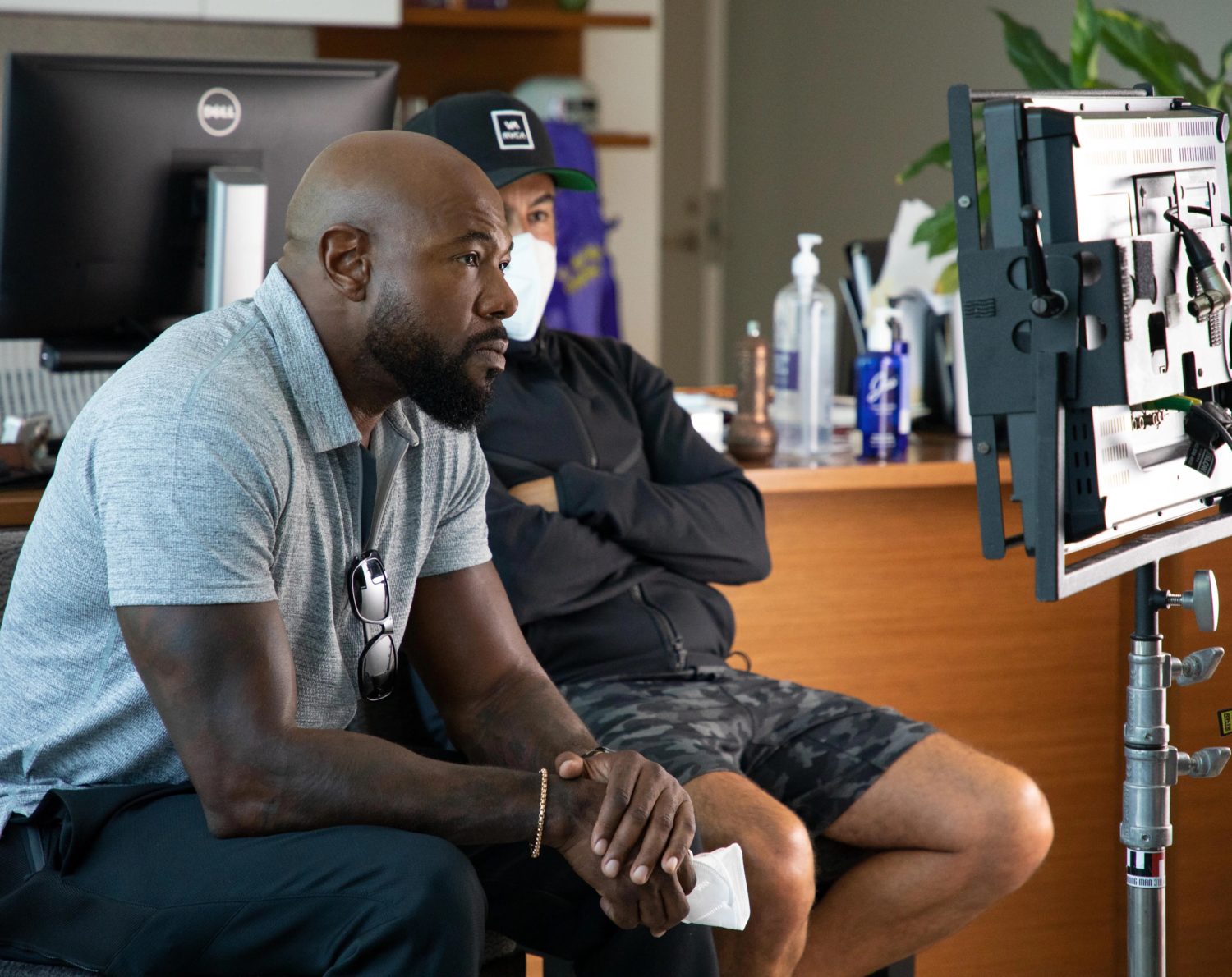
Antoine Fuqua (Courtesy Hulu)
Director Antoine Fuqua, who we speak with alongside Buss at the training center event, clearly approached things with an unflinchingly comprehensive process. Best known for his dramatic film work with Denzel Washington in Training Day, The Magnificent Seven (remake) and The Equalizer films, he’s also worked on docs about Suge Knight and Mohammed Ali. For Legacy he says, ”our goal was just to tell the truth. You know, that’s it.”
“A lot of things out there are wrong, so it’s hard to identify one of them,” Fuqua adds. “Anything that’s not right, it’ll be clear here, because now it’s coming from the people from the inside – from the family and the players themselves.”
It does feel like Fuqua gets everyone involved to provide honest takes on the past, even when the past doesn’t always make the person speaking look so good. This is what should make the show resonate even with fans of other teams as it educates and entertains, taking it beyond a brag fest. Still it’s hard not to feel a huge sense of excitement and pride if you’re an Angeleno, watching so much incredible footage and hearing reminiscences about the godlike gold and purple-clad men who thrilled crowds around the world and influenced culture in ways that went beyond basketball. Fuqua highlights parallels with the rise of hip-hop music and fashion, as well as Hollywood’s tabloidy obsession with fame and drama, infusing the series with tons of newspaper headlines to move things along and a great soundtrack to tell the story.

Phil Jackson (Tiffany Roohani/Hulu)
And of course, the saga continues. The Lakers currently have another iconic player – LeBron James – leading the team, continuing the tradition of elevated sports entertainment that no one else has ever been able to match. The current owner has more than lived up to the legacy her father Jerry (who died in 2013) hoped for, and she’s done it her way, exemplifying female empowerment ahead of her time in all her decisions, from being open about her relationship with Coach Jackson (which lasted 17 years) to posing for Playboy in 1995.
Episode Six foreshadows conflict with her brother Jim, who fired Jackson in 2004, and which she says in the series, put strain on their relationship. The couple managed to stay together for many years after that though (and Jeanie tells us reliving their relationship was one of her favorite parts of the entire project). Still, they called off their engagement in 2016.
The last four episodes of Legacy are sure to cover more of the family conflicts, including the last several years, which saw the Buss siblings battle it out in court for control of the team. Jim was head honcho for the Lakers for over a decade but his last few years were dismal in terms of wins. As “governer” of the team, Jeanie had final say on big decisions so she terminated her brother and brought in none other than Magic himself to help save them (he only lasted in the position for a year).
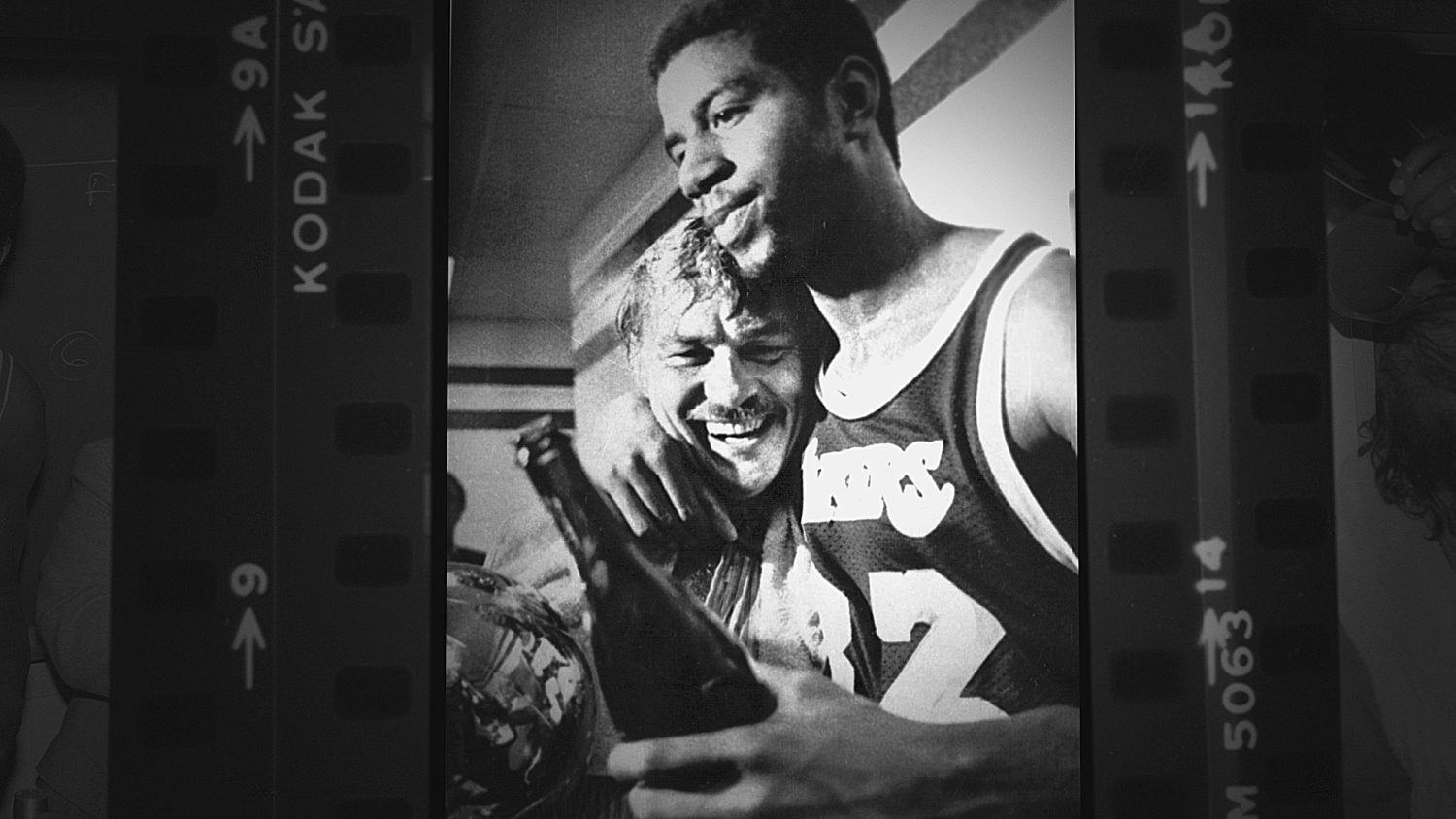
Buss and Johnson (Courtesy Hulu/Los Angeles Lakers)
Buss admits that reliving some of the Lakers toilsome times and tragic moments, such as Magic’s retirement announcement due to contracting HIV, and Kobe and his daughter Gigi’s death in a helicopter accident in January 2020, was extremely difficult because, “those feelings are still raw,” but she adds somberly that, “it’s part of our story.”
Despite the painful parts, Jeanie says Legacy is really about celebrating her dad’s game-changing career. “I want people to know all the innovations that Dr. Buss brought to what we now know as sports and entertainment,” she says. “I think there’s a generation that doesn’t know who Dr. Buss is, and I hope when you see my dad on screen, you get to know him. He was movie-star handsome and he had a charisma that just comes across on screen. He was a natural. This series really captures that.”
Legacy: The True Story of the LA Lakers debuts with two episodes on Hulu this week. A new episode streams every week through October.
xxxx
Editor’s note: The disclaimer below refers to advertising posts and does not apply to this or any other editorial stories. LA Weekly editorial does not and will not sell content.
Advertising disclosure: We may receive compensation for some of the links in our stories. Thank you for supporting LA Weekly and our advertisers.
